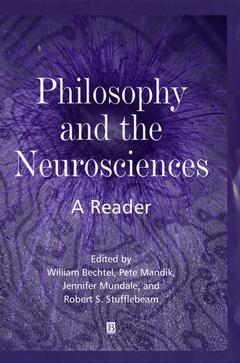Philosophy and the Neurosciences A Reader
Coordonnateurs : Bechtel William, Mandik Pete, Mundale Jennifer, Stufflebeam Robert

Part I: Neurophilosophical Foundations.
Introduction to Part I: Neurophilosophical Foundations (Pete Mandik).
1. Philosophy Meets the Neurosciences (William Bechtel, Pete Mandik, and Jennifer Mundale).
2. Brain Metaphor and Brain Theory (John G. Daugman).
3. Neuroanatomical Foundations for Cognition: The Neuron Doctrine and Brain Mapping (Jennifer Mundale).
4. Epistemic Issues in Procuring Evidence About the Brain: The Importance of Research Instruments and Techniques (William Bechtel and Robert S. Stufflebeam).
Questions for Further Study and Reflection Concerning Neurophilosophical Foundations.
Part II: Language.
Introduction to Part II: Language (William Bechtel).
5. Remarks on the Seat of the Faculty of Articulate Language Followed by an Observation of Aphemia (Paul Broca).
6. Recent Works on Aphasia (Carl Wernicke).
7. The Processing of Single Words Studied with Positron Emission Tomography (Steven E. Petersen and Julie A. Fiez).
8. Modularity, Domain Specificity and the Development of Language (Elizabeth Bates).
9. Linking Cognition and Brain: The Cognitive Neuroscience of Language (William Bechtel).
Questions for Further Study and Reflection Concerning Language.
Part III: Vision.
Introduction to Part III: Vision (William Bechtel).
10. Brain Mechanisms of Vision (David H. Hubel and Torsten N. Wiesel).
11. Object Vision and Spatial Vision: Two Cortical Pathways (Mortimer Mishkin, Leslie G. Ungerleider, and Kathleen A. Macko).
12. Neural Mechanisms of Form and Motion Processing in the Primate Visual System (David C. van Essen and Jack L. Gallant).
13. Decomposing and Localizing Vision: An Exemplar for Cognitive Neuroscience (William Bechtel).
Questions for Further Study and Reflection Concerning Vision.
Part IV: Consciousness.
Introduction to Part IV: Consciousness (Pete Mandik).
14. Consciousness and Neuroscience (Francis Crick and Christof Koch).
15. A Neurofunctional Theory of Visual Consciousness (Jesse Prinz).
16. The Nature of Pain ( Valerie G. Hardcastle.
17. The Neurobiology and Philosophy of Subjectivity (Pete Mandik).
Questions for Further Study and Reflection Concerning Consciousness.
Part V: Representation.
Introduction to Part V: Representation (Pete Mandik).
18. Representations: From Neural Systems to Cognitive Systems (William Bechtel).
19. The Architecture of Representation (Rick Grush).
20. Of Sensory Systems and the 'Aboutness' of Mental States (Kathleen Akins).
21. Brain Matters: A Case Against Representations in the Brain (Rob Stufflebeam) Questions for Further Study and Reflection Concerning Representation.
Part VI: Reduction.
Introduction to Part VI: Reduction (Jennifer Mundale).
22. Intertheoretic Reduction: A Neuroscientist's Field Guide (Paul M. Churchland and Patricia S. Churchland).
23. Explanatory Pluralism and the Co-Evolution of Theories of Science (Robert N. McCauley).
24. McCauley's Demand for a Co-Level Competitor (Paul M. Churchland and Patricia S. Churchland).
Questions for Further Study and Reflection Concerning Reduction.
Author Index.
Subject Index.
Pete Mandik is Assistant Professor and Associate Director fo the Cognitive Science Laboratory at William Patterson University of New Jersey
Jennifer Mundale is Assistant Professor of Philosophy at Central Florida University.
Robert S. Stufflebeam is Assistant Professor of Philosophy at the University of New Orleans.
Date de parution : 10-2001
Ouvrage de 498 p.
17.8x25.4 cm
